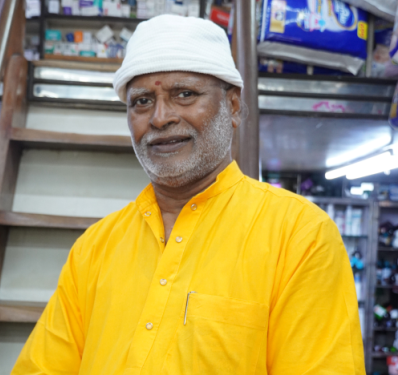Sailendra Narayan Senapati, managing director of Rabindra Lifeline Pvt Ltd, has been a driving force in Odisha’s pharmaceutical industry, championing ethical healthcare practices and patient welfare. Continuing his family’s legacy in medicine by expanding a trusted pharmacy network, his journey is marked by dedication and responsibility. Being in the business for past 24 years, the dedicated pharmacy is the most sought-after location for patients in Bhubaneswar. In an exclusive conversation with OrissaPOST, Senapati shares insights on the challenges faced by India’s healthcare system, the importance of ethical pharmacy practices, and his vision for the future.
Can you tell us about your early life and what inspired you to enter the pharmaceutical industry?
Our family has been in the medicine business for a long time, and we continue to carry that legacy forward. My father was a traditional healer who travelled from village to village providing medical care at a time when hospitals were scarce. He had experience in both homeopathy and allopathic treatments, particularly in administering injections, and people relied on his knowledge. To expand his work, he moved to Bhubaneswar in 1962, where we obtained our first pharmacy license. We opened our first medical store at Rajmahal Square, and from there, we continued to grow, ensuring access to essential medicines for the people.
What do you think is the most important aspect of running a pharmacy business?
For us, the pharmacy business is not just about selling medicines—it is about serving people. There is no fixed working time in this profession. A pharmacist must be available even at night to provide emergency medicines, administer injections, and offer guidance on prescriptions. Back when Bhubaneswar had barely 10 to 15 pharmacies, we were known for our commitment to helping patients at any hour. We see our work as a judicial responsibility, ensuring that people receive the right medication without prioritising profit.
Do you think the Indian healthcare system is struggling? If so, what are the biggest challenges, and how can they be addressed?
Yes, the healthcare system in India faces numerous challenges. One of the major problems is the focus on brand names rather than the composition of medicines. If doctors and pharmacists prioritised the actual composition instead of trade names, we would see more uniformity and efficiency in healthcare. Another issue is the overwhelming number of pharmaceutical brands—there are 30,000 to 50,000 different brand names in the market, leading to duplication and confusion. Some medicines that are widely sold in India are banned in other countries due to health risks. For instance, Nimesulide is commonly available in India without a prescription, whereas it is banned in several nations. Our regulatory system needs to align with international standards to ensure patient safety.
How has your journey been so far, and do you have any expansion plans?
Our journey has had its share of ups and downs, but we have never allowed challenges to weaken our resolve. We have always prioritised patient welfare. Today, we have four branches in Bhubaneswar and one in Jharsuguda, and we are expanding wherever opportunities arise. Our expansion plans are in progress, but good things take time, and we want to ensure that we grow in a way that maintains our core values.
As an entrepreneur, what advice would you give to newcomers in the pharmaceutical industry?
Many young entrepreneurs are entering the pharmaceutical sector. My advice to them is work hard and have a genuine intent to help people. Understanding how to improve people’s health should be a priority. Conducting workshops and learning about medical practices before starting a business will provide the right foundation. The key to success is not just selling medicines but making a positive impact on people’s lives.
PNN






































